#little Jem Blythe
Text
LITTLE JEM BLYTHE'S MOODBOARD
"Jem imagines he is going to be a sailor...like Captain Jim..."
(Anne of Ingleside by L. M. Montgomery).
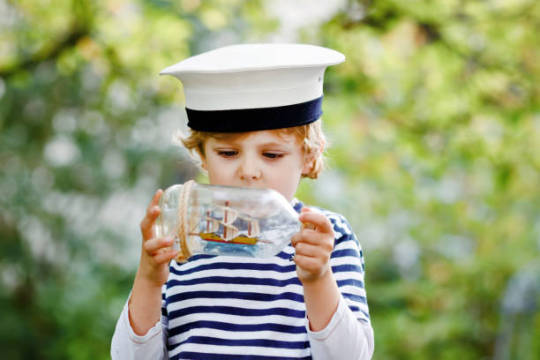







"He was and always had been a sturdy, reliable little chap. He never broke a promise. He was not a great talker. His teachers did not think him brilliant, but he was a good, all-round student. He never took things on faith; he always liked to investigate the truth of a statement for himself. Once Susan had told him that if he touched his tongue to a frosty latch all the skin would tear off it. Jem had promptly done it, “just to see if it was so.” He found it was “so,” at the cost of a very sore tongue for several days. But Jem did not grudge suffering in the interests of science."
(Rainbow Valley by L. M. Montgomery).
#lm montgomery#aogg#anne of ingleside#little Jem Blythe#jem Blythe#I know he became a doctor in the end#But his dream of being a sailor is so precious#Rainbow valley
21 notes
·
View notes
Text
DIANA, teasingly: “You, anyhow. I saw you kissing Faith Meredith in school last week ... and Mary Vance, too.”
JEM:- “For mercy’s sake, don’t let Susan hear you say that. She might forgive it with Faith but never with Mary Vance.”
— The Blythes are Quoted by Lucy Maud Montgomery
#jem blythe roman empire#THIS LITTLE SEQUENCE is such a landmine#one of those things that maud slipped into the canon via tbaq that nearly made my brain short circuit#kissing them both the very same week!#been thinking about jem x mary ever since#/affectionate#the blythes are quoted#lucy maud montgomery
28 notes
·
View notes
Text
If anybody wanted to write a crossover between L.M. Montgomery's books, here is a little help with the ages of the characters (@no-where-near-hero maybe it will be a tiny help for your fanfic):
Anne Shirley - born on 5th of March 1865
Gilbert Blythe - born in 1862 or 1863
James Matthew "Jem" Blythe - born in July 1893
Walter Cuthbert Blythe - born in 1894
Anne "Nan" and Diana "Di" Blythe - born in 1896
Shirley Blythe - born in 1888*
Bertha Marilla "Rilla" Blythe - born in 1900*
Gerald "Jerry" Meredith - born 1894
Faith Meredith - born 1895
Una Meredith - born 1896
Thomas Carlyle "Carl" Meredith - born 1897
Jims Anderson - born in August of 1914
Emily Byrd Starr - born on 19th of May 1888
Ilse Burnley - born in 1888 (probably)
Perry Miller - born in 1887
Frederick "Teddy" Kent - 1887 or 1888
Dean Priest - born in 1865
Patricia "Pat" Gardiner - born in 1913
Rachel "Rue" Gardiner - born in 1919
Winnifred "Winnie" Gardiner - born in 1910
Sidney "Sid" Gardiner - born in 1912
Joseph"Joe" Gardiner - born in 1908
Hilary Gordon - born in 1911
Elizabeth "Bets" Wilcox - born in 1913
David Kirk - born around 1893
Jane Stuart - born in May 1918 or 1919
Valancy Stirling* - born 1883**
Barney Snaith - born 1877**
Cecilia "Cissy" - born 1886**
Olive Stirling - born 1884**
Gay Penhallow - born in 1904***
Nan Penhallow - born in 1904***
Roger Dark - born in 1890***
Donna Dark - born between 1894 and 1896***
Virginia Powell - born between 1894 and 1896***
Peter Penhallow - born between 1888 and 1890***
Margaret Penhallow - born 1872***
Brian Dark - born 1916***
Hugh Dark - born in 1887***
Joscelyn Penhallow: born between 1889-1892***
*In both Anne of Ingleside and Rainbow Valley Shirley is two years older than Rilla. But in Rilla of Ingleside, he turns eighteen few months before Rilla... it is pure chaos. Rilla was supposed to be nearly fourteen, according to the RV, in 1914, but she is nearly fifteen in RoI. So I apologize, but I had a lot of trouble here...
**The Blue Castle is the most difficult to place in time. It is set several years before it was published, and in my own opinion: before Tangled Web and Pat of Silver Bush. Why? Because of this reference: "This was before the day of bobs and was regarded as a wild, unheard-of proceeding—unless you had typhoid." (The Blue Castle). Bobs were already "in fashion" at the beginning of Pat of Silver Bush (so, in 1919, when Pat was six years old: it was said that Winnie wanted to have her hair bobbed) and in Tangled Web (which is set in 1922). Yet, the cars, motorboats and movie theaters were a rather common occurence in The Blue Castle's times. But... there might be an explanation. Valancy doesn't live on PEI, which might have been a little "behind" the rest of Canada, as far as modern technology went. It is my own personal opinion, but I think that it might be set just before the war, at the same time as the end Emily's Quest. I know that the clothes seem more "modern" in TBC, but Emily wore "a little sport suit" and dress that was described as followed "there was so little of it". Teddy and Perry both had cars, as sone of Ilse's cousins. I would say that the Blue Castle book might be set around 1912-1913. Still, the timeline is extremely elusive. Please, let me know, dear Blue Castle Book Club's members, what is your opinion? I think I have read some amazing discussion about TBC's timeline a long time ago, but if I remember correctly, everyone was certain that this novel was set post WWI (me included, until this very moment when I tried to place Pat and Tangled Web and remembered the "bob" quote). So I choose 1912 as the beginning of TBC, when Valancy was twenty-nine.
*** the ages of characters in Tangled Web:
"They were first cousins, who were born the same day and married the same day,--Donna to her own second cousin, Barry Dark, and Virginia to Edmond Powell--two weeks before they had left for Valcartier. Edmond Powell had died of pneumonia in the training camp, but Barry Dark had his crowded hour of glorious life somewhere in France." (Tangled Web).
"Virginia Powell, whose husband had been dead eight years and who was young and tolerably beautiful" (Tangled Web).
"Valcartier, Quebec was the primary training base for the First Canadian Contingent in 1914."
- from: https://www.warmuseum.ca/firstworldwar/history/going-to-war/canada-enters-the-war/training-at-valcartier/
So, from this I assumed that Virginia's husband died in 1914 (so Tangled Web is set in 1922-23). Gay is 18 at the beginning, so she would be born in 1904. If Donna and Virginia were 18-20 when they got married, they would be 26-28 (so still "young"). at the beginning. Peter was 14 when Donna was 8, so he'd be 32-34 at the beginning of the book (same age or a bit older than Roger). Hugh was 35 at the beginning. I guess Joscelyn was a bit younger- most of LMM's heroines are at least two years younger than their love interest. I'd say she might have been 20-23 when she got married, so she'd be around 30-33 at the beginning of the book. I would say Brian is about six years old - he doesn't seem to attend school yet, but is big enough to be sent to the harbour. Margaret Penhallow was about fifty at the beginning of the book.
So sorry that this post was rather long, but it was a great fun to write (even if it took me A LOT of time). Thank you for reading. Please, let me know if you agree. Any feedback will be very welcome!
#lm montgomery#emily of new moon#anne of green gables#tangled web book club#tangled web#aogg#blue castle book club#the blue castle#Pat of silver bush#Rilla of ingleside#Rainbow Valley#I know I haven't included marigold or kilmeny#But I don't know how to place Kilmeny tbh#And I need to reread marigold before i will be able to include her here#I think I will reblog or add them later on
56 notes
·
View notes
Text
Each be other’s comfort kind
In some ways, Jem found being married to Mary née Vance was the easiest thing in the world.
To begin with, if he ever referred to her as Mary née Vance, she cuffed him lightly on the shoulder before she rolled her eyes and then drew him back down for a kiss.
He’d learned the only place to refer to her as Mary née Vance was their bed.
Which he must refer to simply as their bed, not their marriage-bed or anything of a similar high-falutin’ tone which she would accept from his mother and tolerate from Rilla and would otherwise laugh at almost merrily.
As someone not much given to flights of fancy well before the War had made him watch his friends and fellow soldiers gassed and killed, his brother gone without the chance of a farewell, his mind and body scarred in ways he knew as a physician would never fully heal, he found Mary’s unmitigated pragmatism as refreshing as water in the desert.
It also put his father at ease, as Dad said Mary reminded him not a little of his own mother, though Mary was notably less concerned with the vast quantity of pie the Doctors Blythe could consume of an evening, and her piecrust was arguably the equal of Susan Baker’s, though they’d all agreed not to utter such heresy at Ingleside.
In the privacy of their non-marriage, most ordinary bed, with its soft white linens and goose-feather pillows, Jem was free to tell Mary her pastry was actually better than Susan’s, as she had a lighter hand and her piecrust never once reflected any sense of consternation or outrage over some doings in Glen St. Mary, which could not be said of Susan’s best tarts.
Mary was practical and matter of fact. She had a good head for accounts and was far more intelligent that he, any of the Blythes or Merediths (with the exception of Carl) had ever given her credit for. It was easy to discuss the running of his practice and the economic advantages posed by a move to one of the larger towns, the intellectual stimulation offered by hospital work.
Mary did not worry about leaving Mrs. Marshall Elliott behind and she did listen when Jem spoke of his mother’s broken heart with oblique allusions to Walter’s death and more direct remarks about Shirley’s move to Montreal. Even more, she was willing to allow his mother precedence in ways Faith Meredith would never have countenanced.
(Who knew what Faith would truly have countenanced? She’d eloped with Bertie Shakespeare Drew shortly after their mutual return from England and had immediately bobbed the golden-brown hair Walter had once referred to as her crowning glory in a sonnet Jem was never meant to see.)
Mary was patient and funny, an impossibly good mimic. She had a seemingly infinite supply of riddles and could curse a blue streak with the fishermen down in the harbor, who respected Young Doctor Blythe all the more for his sharp-tongued wife.
She complained very little, never as much as she ought about what mattered most, and only to the degree she would amuse him about things that didn’t matter at all.
She was never troubled by his nightmares, by being woken by Jem clutching her tightly, his tears falling onto her neck, salt on his lips when he kissed her.
Mary liked to be read to of an evening, but not poetry. She liked Dickens, which didn’t surprise him, and Eliot, which did. She liked mysteries the best, pulp, which made him chuckle, and Lupin instead of Holmes, but she didn’t press him on nights when anything French was the door opened to memories he couldn’t bear.
She was warm, save for her cold feet. She’d tuck them against his shins and it wasn’t like anything else in the whole world.
She was reliable, steady, quick to take his side. Quick to see his side, even before he did.
She was pretty and she didn’t count it worth much, without any of the vanity of any of the Blythe women.
She was eminently, exceptionally lovable—except that she was difficult to love.
She shrugged off praise.
She didn’t care for ornaments or nosegays, perfume or sweets or what Rilla called a stunning new cloche just the exact color of blackberry fool.
She looked after him and their home so well, there was little left for him to do.
He was at a loss, one she was aware of and found entertaining, when Rilla remarked one day how much Rosemary Meredith’s new cat reminded her of Mary.
Then he knew.
Mary liked to have a cup of tea made just so, with plenty of milk.
She liked to end the day sitting with her stocking feet tucked up under her.
She liked to have her hair stroked, even if his hand trembled, which stopped much sooner when he was paying all his attention to the silkiness of her fair hair and the delicate skin at her temple, her throat.
She liked to sleep early on cold winter nights.
And sometimes, when they were together in the shadows, she liked to be called Puss. She liked it exceedingly well.
#aogg#anne of green gables#fanfic#mary vance/jem blythe#rarepair#mary vance#jem blythe#post canon#canon au#rare pairs about#faith meredith/bertie shakespeare drew#rilla blythe#romance#marriage#jem is a simp for mary#team mary vance#the author and jem are both Mary Vance stans
42 notes
·
View notes
Text
A Tintype of a House with Seven Children and a Large Dog
I love browsing this Flickr account that is full of antique pictures bought in flea markets etc.
They're mostly from America, but since they cover the late 19th/early 20th century, they sometimes remind me of the AOGG book series, especially this one.
Seven children?? (Let's pretend Joy Blythe lived). A dog! (Hello Dog Monday!)

If you look closer you can even see that there are 3 boys (Jem, Walter and Shirley), and 4 girls (Nan and Di, Rilla, and another little girl...) in the picture.
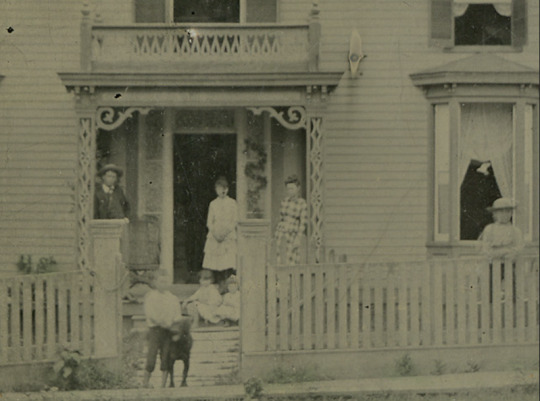
14 notes
·
View notes
Text
Oh, Anne Shirley, and her wonderful, uplifting, sweet, wholesome stories. The series begins with a little orphan girl who finds a home and a family, saving Matthew and Marilla just as much as they save her. Anne walks as if about to fly, wandering through life with her head the clouds but her heart in the right place, and even through all her scrapes, from the embarrassing to the wrong to the hilarious, she keeps her eye true to herself and retains her sense of wonder and imagination even as an adult.
So, how do we reconcile this with how the series ends?
You mean Rilla of Ingleside, batrachised? you ask, thinking of our more heartbroken and downtrodden Anne. But no. I'm referring here to The Blythes are Quoted. This is the book that actually contains the last glimpse we see of our beloved Anne Shirley. And, to be frank, it's dark. I read it the other day (although my friend gogandmagog warned me, she WARNED me) and had to sit with it.
Before I share the passages, some context: LMM intended TBAQ to be published, although it wasn't published in her lifetime. The foreword to the book notes the difference between the Piper poem referred to Rilla, and Walter's hopeful letter about making Canada safe for the poets of the future--and then, what we see in this book.
Here is the last chapter we get in Anne Shirley's story [warning: heartbreaking]:
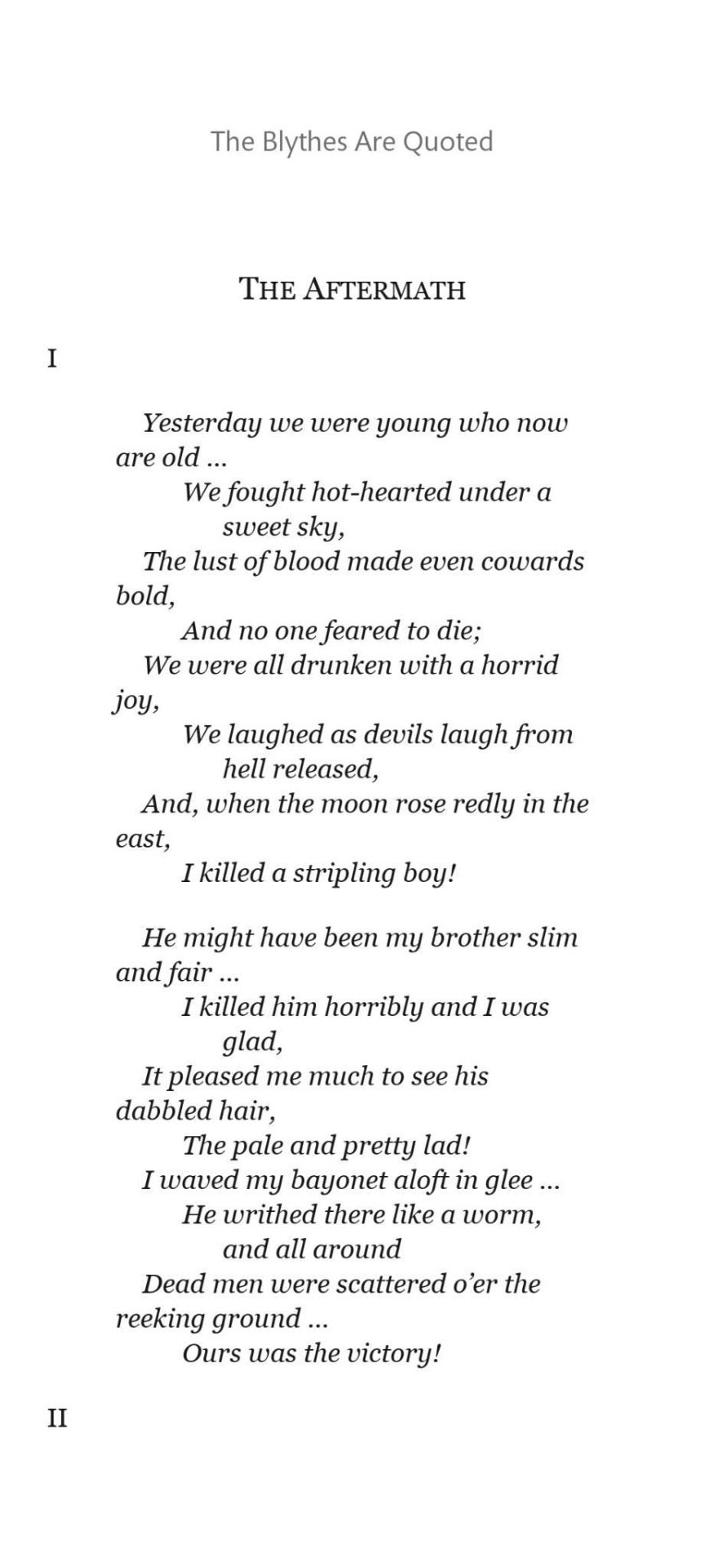
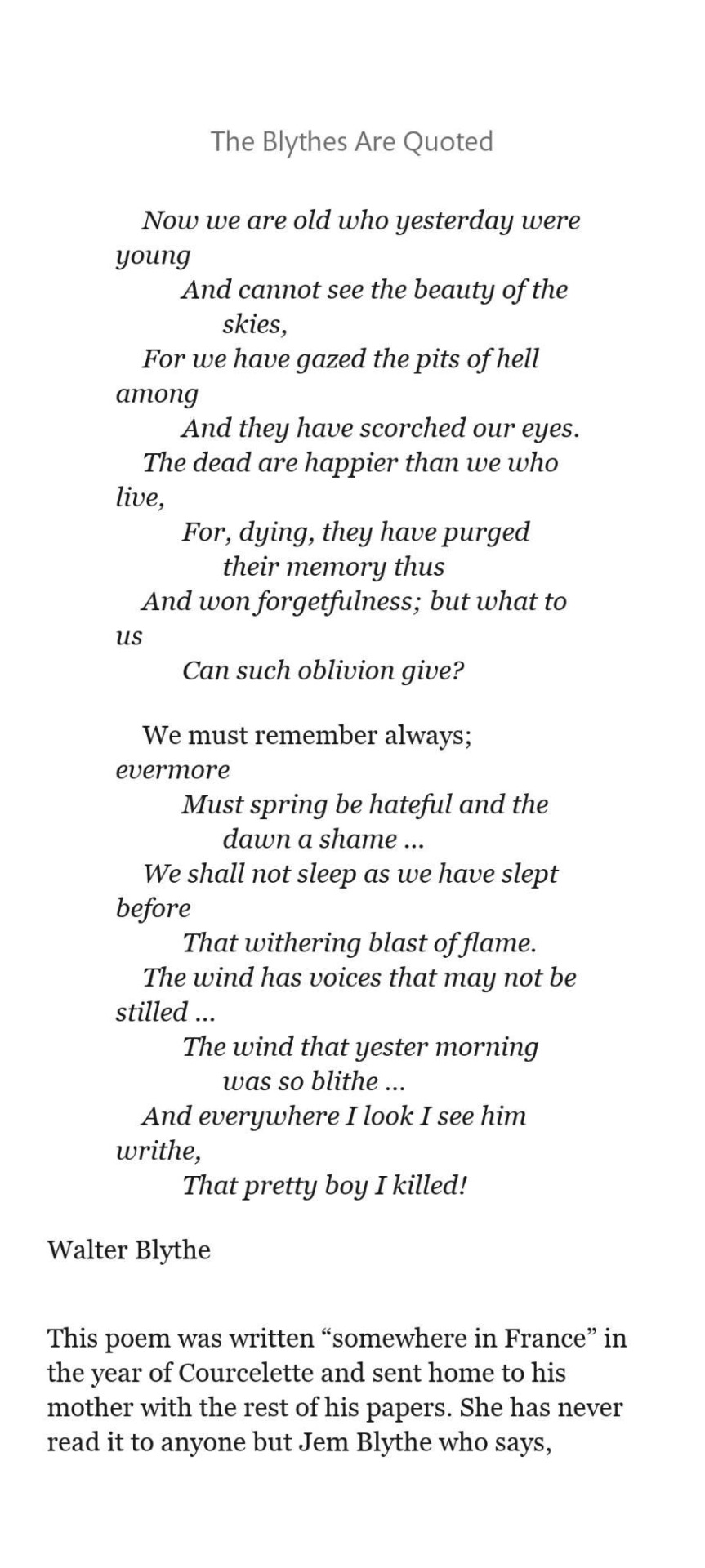
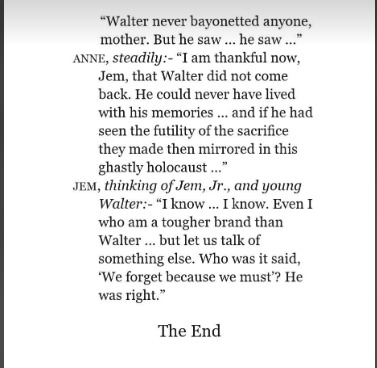
So there we have it-- a poem where Walter imagines killing a boy (although I personally think we could read this as Walter actually killing someone, because how would Jem know?) and then Anne steadily saying she is thankful Walter didn't live to see what the world would become. At the end of TBAQ and the Anne series, WWII is raging. Rilla reflects on how, once again she's waiting for the horror to end, but this time with a son at the front. Even Jem, so bold in the first book (although he returns "no longer the laughing boy brother" who left), now has sons in WWII, now the one waiting at home for their safe return.
There's a lot to reflect on on this passage; how LMM clearly became disillusioned by WWII -shown in Anne's words, how the front impacted Walter's imagination and creative outputs, how this is the ending LMM chose for the characters (although perhaps she would have written more if she had lived longer, we can never know)--"The End" here is stark. "We forget because we must," the last words LMM wrote for Anne's story.
But, I think Jem is wrong (from a certain point of view). I had to mull over the contrast between what Jem says and what Walter writes (and also because, to be honest, my ability to interpret poetry is of equal capacity to a toenail's). Jem describes himself as made of tougher stuff than Walter, but what stands out to me here is that, from a certain perspective, Jem's thoughts are radically different than his brother's. Jem explicitly says they must forget; Walter explicitly says they must remember always. Even in the poem, assuming this isn't a publisher error, those words aren't italicized, emphasized amidst the rest.
Of course, Walter is discussing the pain of remembering; his message is that he'll never be able to forget, which parallels Jem's of having to forget. Both touch on the horror of WWI from different directions. To be clear, I think that was LMM's intent. But stepping beyond her intent, there's an underlying, unintended (?) message here of how forgetting risks repeating, something the characters are living through. Forgetting risks rendering the sacrifices made futile.
To my earlier question of how we reconcile this end: we don't, at least in my opinion (although I'd love to hear other's thoughts). I think the message here is all the more powerful because it's from our beloved Anne. It demonstrably condemns war, without any sugarcoating or even hope. A sharp contrast to the rest of the series, yes, but I think it's a fair one.
#the blythes are quoted#walter blythe#aogg#anne shirley#i'm about to do my “every time LMM foreshadows Walter's death” post too haha#it's PAIN TIME#i recognize these thoughts are rambling but please do not expect me to be coherent or normal about this passage#it's too SAD
82 notes
·
View notes
Note
Top 5 fictional crushes ✨
This was so hard: I felt exactly like this tiktok
Anyways after much deliberation:
Simon Lewis
James Herondale
Jem Carstairs
Gilbert Blythe
Percy Jackson
Simon Lewis - my favourite character from TMI; I couldn't see why Clary was going for the broody angsty type when Simon was right there! I especially love him in TFTSA when he's not putting up with any of the shadowhunters' bs. So much more I could say but you also love Simon so I'm sure you already know why.
James Herondale - I love this boy so much. He's so polite and shy especially when he was younger; bookish and so loyal; it was so nice seeing him come out of his shell a bit and be confident and comfortable with the people he loves. Also!!! the people he loves he loves them with everything he is; he's also just so charming but without being cocky? Also very cute; I 100% see why Cordelia likes him so much
Jem Carstairs - I feel like at this point you can probably recognise a pattern in terms of my type lol. Jem is the sweetest human being alive and gentle and kind and so strong. He chooses to be kind and a good person everyday, despite all the horrors and suffering he has faced and the cruel hand he has been dealt. Even the small bit I've said does not fully encompass who he is as a person and fully capture why I love him so much
Gilbert Blythe - this man!! Honestly I love the romance between him and Anne so much; especially over the course of the first three books. He's hardworking, he tries so hard to be Anne's friend and just is so earnest in his efforts? He sees Anne exactly how she is and loves every single part of her - that quote in Anne of Avonlea where it says if Gilbert had been asked to describe his perfect girl, it would have been Anne, right down to the freckles on her nose that she hated so much? *screams* that is the kinda romance I want; also the way when Anne rejects him and he respects that and takes that step back to create that distance between them that he needs cos all those little things had meant so much to him and he needs space to just be her friend.... this man, just I love how respectful he is while also being able to acknowledge what is best for him. He never punishes Anne for not being able to give him more than friendship and respects her decision and does continue to be friendly; but also respects his own boundaries and knows how to put himself first. Gilbert was never cruel; I also just love their friendship and how close they were in Anne of Avonlea especially. He also pushes Anne to do her best and sends Anne the lilies of the valley when she graduates, the necklace as well at Christmas(?), letting Anne know there's no hard feelings and still showing her love and caring in a way that honours the years long friendship they've always had. Going to stop now cos otherwise I will never stop but yes Gil is just the perfect gentleman and I adore him.
Percy Jackson - this one especially I was like I love Percy - in what way ???? Percy Jackson is a character I have so much love for and his relationship with Annabeth is my absolute favourite thing to read about. I started reading Percy Jackson when I was 12 and then flew through pjo and hoo in like a year or so, so I went from being the same age as him to younger and then slowly over the years with TOA etc eventually becoming older than him. It's been a weird experience. I have so much love in my heart for Percy Jackson and I will always be so happy that I picked up these books all that time ago
#jules💖#simon lewis#simon lovelace#james herondale#jem carstairs#james carstairs#gilbert blythe#percy jackson#tmi#the shadowhunter chronicles#tsc#shadowhunters#tlh#tid#tftsa#the mortal instruments#the last hours#the infernal devices#tales from the shadowhunter academy#anne of green gables#aogg#anne of avonlea#anne of the island#anne shirley#shirbert#pjo
16 notes
·
View notes
Text
Walter Blythe and Beth March would've been besties.
Not just that, all the March, Blythe, AND Meradith kids would've been such good friends?? Like imagine Jo and Faith talking about society's rules and how they break them not so subtly. Di and Meg talking about dresses and their hair. Amy trying to teach art to Mary Vance. Jem and Laurie fighting over who could catch more fish and accidentally making a feast.
Just, the kinda weird but well-meaning kids messing around in Rainbow Valley together, visiting each other, it seems so sweet.
#walter blythe#jo march#amy march#di blythe#nan blythe#jem blythe#beth march#little women#anne of ingleside#rainbow valley#this is the best idea ive had all year wow
36 notes
·
View notes
Link
its been a while since i’ve promoted this group but like its for all doll collectors out there. it’s mostly people 18+ and we also have people who like to collect anime figures and action figures if thats what you’re into!
#monster high#ever after high#barbie#my little pony#barbie fandom#jem and the holograms#blythe#pullip#bjd#Ball joint doll#ball jointed doll#abjd#smart doll#mattel#hasbro#winx club#dc superhero girls#fashion dolls
3 notes
·
View notes
Text
The funniest & most heart-warming things Anne Blythe's nee Shirley's children did:
Jem Blythe:
funniest: saying "But will you like it if I just go away 'n' shoot tigers in Africa?" or "Susan, how do you stab sharks?",
most heart-warming: earning the money to buy Anne a pearl beads necklace for her birthday and believing the pearls were real.
Walter Blythe:
funniest: bringing home two toads to "study" them and worrying when one of them escaped - because what if they were married?
most heart-warming: returning home from Lowbridge in the middle of the night because he was scared that Anne was dying.
Diana Blythe:
funniest: naming her and Nan's old rag-doll after Aunt Mary Maria and drowning the doll each time Aunt Mary Maria vexed her or Nan,
most heart-warming: caring so deeply about people and being so sensitive to their suffering.
Nan Blythe:
funniest: betting against God,
most heart-warming: saving a little kitten when she was only three or walking on the graveyeard because she wanted Anne to get better.
Shirley Blythe:
funniest: saying "Ugly old Aunt Maywia," when he was two,
most heart-warming: sitting on the edge of the table in the living-room, swinging his legs at the age of eighteen.
Rilla Blythe:
funniest: believing Gilbert was a murderer because he his picture in a newspaper,
most heart-warming: bringing baby Jims in soup tureen and taking care of him.
45 notes
·
View notes
Text
✨Anne Blythe’s (Anne Shirley-Blythe’s namesake granddaughter) father is not Jem. It’s Shirley. It’s totally Shirley, you guys. It’s gotta be.✨
And like, Ieading right off by saying of course there’s no definitive answer to be had here, since Maud obviously isn’t available to confirm or refute any hypothesises, but I do big persist in suggesting that a very rational case can be presented for Shirley... one that at least outweighs what I now see as the generally baseless widely accepted assumption that Anne is Jem’s daughter. Keep in mind, I’m in no way trying to dog on this. The assumption is ready and easy to make, and I’d accepted fully this theory too, until about a week agooo.
ABOUT A WEEK AGO, I was poring over various Wikipedia entries for the Anne book series, and inevitably also ended up looking through the edit history of those pages. While sorting through the edit history (super extensive and interesting, by the way), the username ‘blefebvre’ popped into the archive, contributing a ton of information to the Anne pages overall, around 2008 and 2009 particularly. And literally, who else could this user be besides THE Benjamin Lefebvre? Brilliant Maud scholar and essayist, inexhaustible editor and publisher of ‘the Blythes are Quoted’? Welllll, one of these edits, a written family tree of Anne and Gilbert’s grandchildren, mentioned Anne Blythe... and pointedly noted that she was either the daughter of Jem or Shirley.
Reading that? Already a huge jump-scare surprise to me. This immediately challenged what I thought I knew about the third generation of Blythes. I sat straight up in bed, brain doing a nosedive, like wait wait wait wait wait… hold on, what? We don’t know for sure? We don’t know for sure?
Guys. We don’t know for sure.
Whichhhhh sent me on an immediate hunt to gather up what we do know for sure. The facts we do have. And it wasn’t a huge task, either… there’s really not a lot to collect.
But here it is:
In ‘the Blythes are Quoted’, Anne Blythe is mentioned in only one story, titled “The Road to Yesterday” (not to be confused with the TBAQ abridged predecessor book of the same title 😅).
All we really have of her is her name, and a couple of superficial second-hand anecdotes from a guy named Jerry (who is impersonating a fellow named Dick, but more on this a little later).
Her paternity is unconfirmed, but because her surname is Blythe (not Ford or Meredith), we can logically eliminate the possibility of her belonging to Nan, Di, or Rilla. Walter was, of course, lost in France. This leaves Jem and Shirley.
Tiny details about Anne.
As a matter of housekeeping, let me try to get the jump on any potential counter-arguments, and clear the air.
The only reason I’ve seen Jem credited with Anne is because…
1. Jem was married.
That’s the entire basis.
And I’ll grant you that. This is more than we got for Shirley. But let’s remember that at the end of ‘Rilla of Ingleside’, we only had a canon engagement between Jem and Faith... it takes getting around to ‘the Blythes are Quoted’ to absolutely conclude that their marriage went through. With the added extra bonus of finding out that they have children.
But even allowing that, ‘the Blythes are Quoted’ as an epilogue isn’t all inclusive. It isn’t a complete picture. It’s half a picture at the very best. Maud, pressured greatly, basically dumped all her disorganised, non-chronological and unedited Anne relevant WIPS + short stories + poems on her publisher's desk two days before she died. This is not a book that Maud put together, as a tailpiece collection. It was an assortment of partial works and in-character conversations that she’d tinkered with over decades. Works she never intended to see being published. They were vague ideas she was forming, little seeds. (It took a lot of effort from Benjamin Lefebvre to put TBAQ together in a readable way that made sense.)
Maud was over Anne. Over Anne by twenty years, at this point. So much so that noticeable character details and world building started slipping in Ingleside and Rilla… for obvious instance, in the lack of continuity around Shirley’s birth year, and the way readers saw almost no closure/representation for Shirley and Di, with varying degrees of near erasure in the original books.
But this doesn’t mean that Maud didn’t have plans for these two characters... their incomplete or unsatisfying stories certainly weren’t nefariously intended to be that way (there’s no secret meaning to the exclusion); Montgomery was just depleted and had been feeling ruinously dispassionate about the Blythes stories since ‘Anne of the Island’.
In ‘Reading Rilla’ we see in Maud’s many pages of left-out notes, that an ultimately scrapped journal entry from Rilla indicates that Diana Blythe wrote to their mother of her engagement to a foreign overseas officer. It’s unclear if this officer is the same ‘Austin boy’ that an older Glen woman in ‘the Blythes are Quoted’ privately wonders about (if Di 'really is engaged to him or not'), but this contradictory bit is probably just erroneous gossip from an unreliable narrator.
Anyway. All of this to say... that just because we don’t have a canon marriage for Shirley, it doesn’t disqualify him from having had a wife and kids in Maud’s post-war Four Winds. TBAQ stories were, to reiterate, half-pictures. Pictures that did/could drop a plot bomb in a single sentence. Looping back to Di, canonly we don’t have a marriage for her either... and yet, we do have two engagements that half-register. One engagement was definitive, reported by Di herself. The other a passing curiosity from someone not close enough to the Blythe family to know.
So... clearly, Maud had active intention, a plan, for Di and her own little happy epilogue. The same can be believed for Shirley. (I’m dying for the day the ‘Rainbow Valley’ and ‘Ingleside’ manuscripts get published, I’m convinced there’s more Shirley be found in the notes.)
Now, let’s dig in to Anne Blythe herself.
‘The Road to Yesterday’ is a short story about a woman named Susette (a spinster at 28), who is on the brink of an engagement to a wealthy man named Harvey Brooks. She expects the next day to be proposed to. On a whim and feeling nostalgic, she drives to Glen St. Mary, where she lived in her girlhood, for the evening. While there, she runs into a fellow, whom she believes to be Dick, her childhood bully who she hated profoundly. Except now, they’re grown and capable acting chummy over their shared memories. The weather takes a bad turn, and they take shelter and a meal together. Susette spends most of the time, all their ‘do you remembers’, being irritated by Dick’s constant name-dropping of the Blythes. He claims to have been kind of secret friends with Anne Blythe, which is contrary to Susette’s memory that Anne hated Dick. (In the end, it turns out that Susette was right… this isn’t Dick she’s talking to. It’s Jerry Thornton, Dick’s cousin.)
For the official record every Blythe mentioned in ‘the Road to Yesterday’ is as follows: Doctor Blythe, Mrs. Doctor Blythe, Rilla Ford, Jem Blythe [Jr.], Di Meredith [Jerry and Nan’s], and Anne Blythe.
It’s mostly a bunch of school yard talk, but the big takeaway for this purpose is that the Blythe/Meredith cousins all hung out together as school children.
Here’s some direct examples:
*****
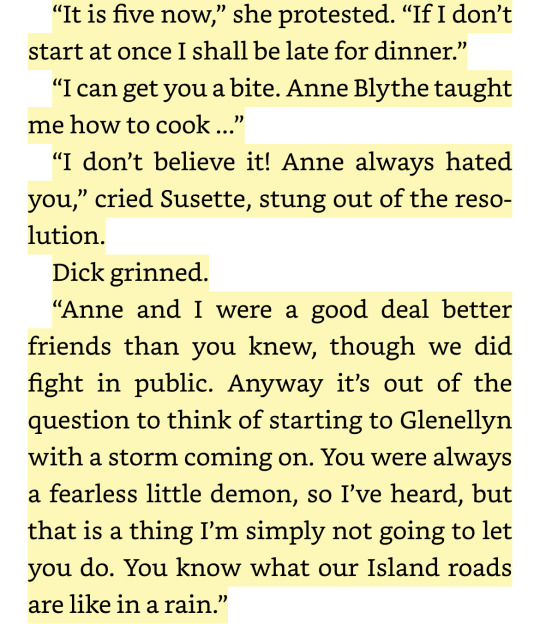
*****
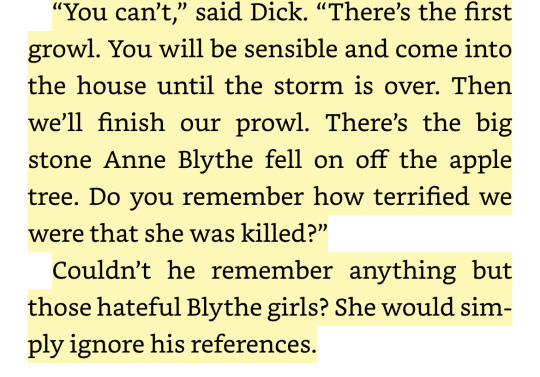
*****
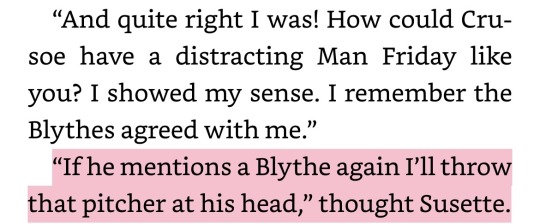
The cheap boiled-down version of this exchange, for those who haven’t ‘the Road to Yesterday’ is basically: Susette is having strange feelings during this interaction with ‘Dick’, she’s attracted to him, declaring to herself that she won’t fall in love with him, and is clearly irritated with the near constant Anne Blythe (especially)/Blythe references. Though she herself was very fond of Jem Blythe Jr. herself, during their childhood, ‘Dick’ mentioning Anne Blythe so fondly is increasingly Not Cute to Susette. Meanwhile, ‘Dick’ is enjoying this kind of teasing, and is lowkey successful at getting a rise out of Susette, not matter how determined she is to look unaffected.
But here’s the kicker... when ‘Dick’ finally leaves off mentioning Anne Blythe, guess what topic he moves on to? 🥁
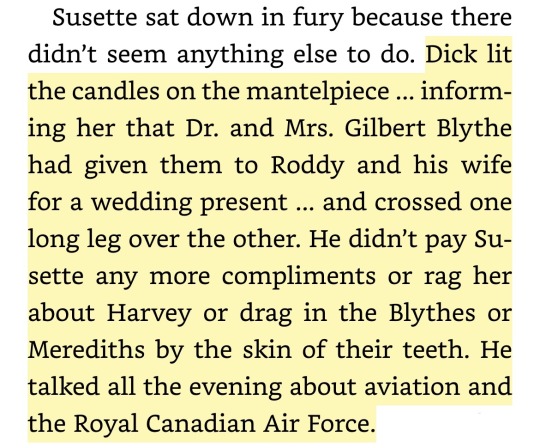
The Royal Canadian Air Force.
And just who do we all know that was in the Royal Canadian Air Force?
Shirley.
Only Shirley.
First, it tracks that ‘Dick,’ soon enlisting (we’re on the brink of WWII timeline-wise), and thinking himself funny, would choose to move on from Anne Blythe to instead a subtler rib… what he, as a once good pal of Anne’s, would know was Anne’s dad’s war faction. It’s also in the realm of possibilities that thinking on Anne so much drew up this correlation. I also ALSO think it’s worth mentioning that the only other time that the Canadian Air Force is mentioned in TBAQ is a very passing drop for Rilla, thinking of her son Gilbert Ford enlisting with the CAF. That’s it. Just those two times.
Additionally important to note is the overall subtext tone in TBAQ, which is Maud’s very greatest collection of double-vision, double-speak and intertextual reference works. There’s a beautiful scholarly essay on this, in relation to TBAQ particularly HERE.
This doesn’t only apply to cultural references in TBAQ. It also adds layers to Maud’s own existing Anne series. It really could be considered a companion piece, with X-Ray vision, e.g. how we got a ton of ‘missing’ insight into Anne and her children’s lives and minds, during the Rainbow Valley era, in Part 1 of TBAQ.
Part 2 of TBAQ (where we find ‘the Road to Yesterday’) asks us to apply what we already know to the new text we’re given.
So, understanding this … if we’re going off what we already know from ‘Rilla of Ingleside’…
What’s the reason we have the Canadian Air Force mentioned in the same story that we learn of the existence of Anne Blythe? The connection?
It’s Shirley. 🥹
A weaker argument that I’ll only mention in mild passing, because it is very weak in terms of convincing evidence, is that the text unambiguously tells is that Anne Blythe has taught ‘Dick’ from Susan’s famous recipes. Susan is another Shirley tie. It’s there to be stated. BUT. I do admit that I think Susan would’ve taught every willing Blythe grandchild with the same zeal, maybe some partiality given to the Little Brown Boy’s kid(s).
BUT, for me?
I’m properly convinced here.
Shirley was a dad, ya’ll.
#long and messy post#wrote this out in twenty minutes and i’m certain it’s utterly infested with grammatical errors and typos so i already beg your forgiveness#IF ANYONE would like to take up a counter-argument i am fully sat#shirley blythe#meta#lucy maud montgomery#the blythes are quoted
86 notes
·
View notes
Text
Old Friends
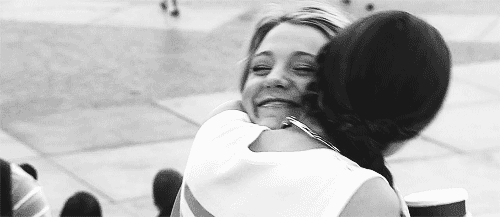
Pairings: Gilbert Blythe + Anne Shirley
Summary: Anne, Gilbert and their children run into one of their old friends.

Winnie had come back from Paris, ready for one of her friend's weddings. She looked around the familiar city she grew up in.
A carriage pulled up further up the street and out climbed a man - a fairly familiar man. It was none other than Gilbert! He reached into the carriage and helped out a young boy, about 9.
She smiled at the grown man that she 'courted'. The little boy had curly red hair. He had a proud look to his face, almost like he had something planned. Gilbert pulled out a small brass piggy bank, the same proud smile plastered on his face.
About 5 more children piled out of the carriage, which made Winnie raise her eyes in surprise, the times they went to tea, she had told him things that they shouldn't be discussing - she didn't know he wanted children.
A smile brightened up Gilbert's face, as he took a delicate feminine hand in his and helped his beautiful wife, an emerald engagement ring on her hand - the hand that Gilbert brought to kiss mouth and pressed a kiss to her knuckles. The elegant updo of red hair and blue dress contrasted elegantly. It took Winnifred a while to figure out that Gilbert Blythe's wife is none other than Anne Shirley-Cuthbert!
She's holding a baby in her arms. From where Winnie stood, the baby looked like a beautiful mix of the pair. Sweet reddish-brown hair. The baby opened her eyes, softly taking in her surroundings, hazel eyes greeted the world, as Anne cooes down at the baby, holding a finger out to the babe (that she takes with her whole hand and shakes Anne's finger around a little).
The first child that had come out of the carriage with Gilbert had started running around the family, obviously wanting to spend the pennies in his little piggy bank.
"Jem, calm down, darling. We'll go in a minute," Anne promises the boy (Winnie had learned his name as Jem - possibly a nickname?).
"Mr and Mrs Blythe, what a surprise," she says, smiling at the couple. Gilbert had his hand resting on the head of a little girl - who looked exactly like Anne. The pair looked up at her, with fairly similar smiles on their faces.
"Winnie," Anne smiles politely at her, the watches over the older woman's shoulder as Nan and Di have their faces smashed to a window at the sweet shop. "Excuse me," she says, moving around Winnie to speak to her youngsters. "Nan! Di! What on Earth are you doing? Stop it!"
Gilbert lets out a soft chuckle, knowing that Anne is so tame with their children - compared to how she was when they were teenagers. The number of scraps and adventures she got into. He often thought that she had become extremely tame and placid after they got married (how they numerous times that she had meddled when they were living in their 'house of dreams'.
He could see Jem jumping waiting to go into the little jewellery shop and spend his hard-earned pennies on a pearl necklace for Anne. The one Matthew got her broke months ago, and it seemed to have been engaged in Jem's mind as the tears ran down Anne's cheeks, that she isn't his mama without her pretty necklace.
Walter was stood waiting with Jem, holding little Shirley's brown hand. The small boy had only just learnt how to walk over the past month and relied on anyone nearby to help him (though it was mainly Susan that he clung to after Anne fell ill for weeks after he was born).
Gilbert kept a polite conversation with Winnie, as Anne got their children under control (even with the small babe in her arms), as Prissy Andrews wanders over and they link arms.
To say Gilbert was slightly surprised, but he was happy for the pair. "The wedding will be starting soon," Prissy says, then looking at Gilbert in surprise. "Gilbert Blythe!" He laughed as she wrapped him up in a surprise hug.
"Anne Shirley!" She then exclaimed, also wrapping the redhead in a hug when the woman laid eyes on his wife. Little Rilla was squished between the pair, and let out a squark-like noise so that Prissy would know she was there.
"Well, it's Anne Blythe, now," Gilbert pointed out, a massive grin plastered on his face (after winning the heart and hand of the only woman he would ever love).
A smile brightens Prissy's face. "I always hoped it would be you two!" This made Gilbert happy - the fact that someone else outside of their families saw how good of a 'match' they were. "Ruby never stood a chance when Anne was in your heart from that first day," Whenever Ruby's childhood crush on Gilbert is mentioned, the poor girl would hide away in Moody's shoulder - her husband.
"We best be going, Jem's getting impatient," Anne says, running her hand along the top of said boy's head - his red hair and hazel eyes a perfect mix of Anne and Gilbert. Anne will never like how Jem, Di and maybe even Joyce if she had survived. But Gilbert loved that Jem and Di inherited Anne's lovely red hair - the lovely red hair that drew him to her in the first place.
Gilbert nods, as Anne walks over to where the rest of their kids stand, waiting for their parents. Gilbert smiles at the group, and look at the pair in front of him. "Jem wants to get Anne a pearl necklace. Matthew bought her one after she finished Queen's, it broke a couple of months ago. Jem doesn't like the fact that Anne doesn't have her necklace,"
Winnie laughed, as the clock chimed half 11, Prissy and Winnie would have to go to attend the wedding they were invited to - Anne and Gilbert would have invited Winnie, but she was still in Paris at the time.
"It was nice seeing you, Gilbert," She told him, as Gilbert reached over and hugged her (the way he felt they should have ended their 'thing').
"You too, Winnie," he smiled, as he walked Prissy and Winnie walk away. He walked to join his family. He never noticed Winnie turning around to watch Gilbert press a kiss to Anne's cheek and take one of the little girl's hands, as the family walk into the jewellery shop.
#shirbert fic#shirbert#anne x gilbert#canon blending#anne shirley#gilbert blythe#Jem Blythe#Walter Blythe#Nan Blythe#Diana Blythe#Shirley Blythe#rilla blythe#prissy andrews#winifred rose
19 notes
·
View notes
Text
"There were jolly playmates there, too—“Uncle” Davy’s children and “Aunt” Diana’s children." (Rainbow Valley).
I tried to guess the ages of all the children:
Fred Jr. Wright - 19
Anne Cordelia Wright - 17
Jack Wright - 15
Jem Blythe - 13
Walter Blythe - 12
Nan and Di Blythe - 10
Shirley Blythe - 8 (although he wasn't in Avonlea - he spent the summer with Susan)
Rilla Blythe - 6
Davy's children - nothing is known of them, except that Davy got married not long before the events of Anne of Ingleside ("It's not so lonesome now since Davy got married..." - Anne of Ingleside). There is no mention of any babies or toddlers in Green Gables at this time, though, so I suppose that Davy's children might be close to Rilla's age or younger - so basically very young.
The possible dynamics between the kids/teenagers:
I think that the twins would adore and dote on Davy's babies and Rilla could play with the older ones. Jem and Jack might be chums, especially since they seem to have similar personalities. Walter and Anne Cordelia were described as very imaginative, so I can see them as getting along very well. Anne Cordelia would probably be a sort of "big sister" to the twins and dote on little Rilla. I see her as being especially close to imaginative Nan (since the girls shared the same name and similar personalities). Fred might be a sort of... mentor to Jem, especially since Jem was at the age he might begin to think that "the girls" weren't quite so yucky after all.
Do you have any other ideas/headcanons for the friendships between Anne's and Diana's children? I always felt sorry that they weren't closer in age and leaving near each other.
@diario-de-gilbert-blythe
@pinkenamelheart
17 notes
·
View notes
Text
And each slow dusk a drawing-down of blinds

Walter had died a week ago and Gilbert didn’t want to go home. He sat at his desk and pretended to himself there was another prescription to write or that he’d told John Campbell to call round when he could, there might be something Gilbert could do for his bad hip, something he’d seen in a medical journal, the receipt for a liniment that truly was better than the salve old Mrs. Thelma Morrison stirred up of an evening, more efficacious and less likely to advertise his arrival with the rank scent of ramps crushed in tallow.
It was a lie.
There was no work yet to be done that would keep him, unless there was some queer version of mercy at play that would deliver a fisherman with a hook deep in his palm, calling for finesse and patience, the lamp lit against the dark.
It was quiet, the voices in the harbor hushed or still, and there was nothing more for him to do but admit the truth.
He simply didn’t want to go home.
It was not that the house would be empty, though that would be its own grief he knew. To go home to Ingleside and find no lamp lit against the dusk, no Anne on the sofa with a basket of mending and a book marked with a frayed scrap of ribbon, no Susan banging about in the kitchen, no Rilla dandling Jims on her knee, cheeks pink with a self-righteous spite as she complained about her Junior Reds, so much like her mother had been at the same age. The rooms all too big, the silence too loud.
And agony and yet, a surcease.
The house was full. Anne and her suffering, her grey eyes dark, her hair dressed very simply, beyond any attempt at vanity, drifted from the sitting room to their bedroom, aimless or beyond settling. Susan, cooking up whatever she thought might tempt one of them to take more than a few bites, catching herself about to mention Walter every third sentence, Miss Cornelia coming by with a basket of baked goods Gilbert would bring on his rounds to prevent wasting the food that no one in the house would eat. Rilla with her sisters, Nan and Di home from the college, all three reminding Gilbert of nothing more than a wilted nosegay, Nan and Rilla’s eyes reddened from weeping, Di’s lips bitten, chapped, her bright hair bundled back in an old-fashioned snood she’d have previously mocked in amused derision, the littlest Meredith girl sitting beside them, too thin, too pale. She’d been in love with Walter, that was clear now, and it was no longer charming or worth shaking his head over ruefully.
So many broken hearts. None he could fix.
Jem didn’t know yet, nor Shirley. He and Anne had agreed not to cable or write either of them. There was nothing they could do but grieve for their brother but that grief might be a distraction they could ill afford. The girls hadn’t argued as he’d expected and it was Rilla who’d spoken up, saying Let him be alive a little longer then while Nan crumpled up the letter she’d been writing to Jerry Meredith.
She would have been telling him about Walter. She wouldn’t risk him, nor the rare chance that he’d come across Shirley or Jem and mention Walter’s death. It was impossible to think Jerry would simply run into Jem in the trenches, except that stranger things had happened and Walter, his inquisitive little boy with his mother’s eyes, had been lost to them. His name on a telegram was all they’d get unless some officer in his battalion had the wherewithal to pack up his few remaining personal belongings and send them back to Ingleside on a ship that didn’t get sunk crossing the Atlantic.
Impossible.
Real.
His office was a place of relative respite. Walter had spent little time there, not interested in doctoring, not like Jem or Di, and so he couldn’t haunt it. There were charts to review and journals to leaf through, and no one came who wanted him to be anything else other than Doctor Blythe.
Not Dad. Not Gil dear.
His own parents, thank God, were dead. Marilla too and Mrs. Rachel.
The clock ticked. He’d have to leave soon enough.
The face that peered in through the door after the briefest, smartest rap, was not one he’d have ever expected.
“I was sent to fetch you, but we can go the long way back,” Mary Vance said. In the failing light of evening, her queer, pale eyes gleamed like the stones he’d liked to skip across Willowmere when he’d idled on the way home from Green Gables. There was a sturdiness to her shoulders and the set of her chin that had become reassuring to a man who now lived in a house of wraiths. She was twenty-three, just a year younger than Jem, a woman grown and not a girl, though she’d no pretense to vanity in her person or tone. Practical and imperturbable, she was one of the few people he could think of he needn’t take care of.
“Mrs. Blythe sent you?” he asked. He tried not to hope Anne had worried enough to speak of it.
“Mrs. Elliott,” Mary shrugged. She knew he would be disappointed, but she wouldn’t lie. “Said you’d soon be needing a doctor yourself if you missed your supper and she doesn’t think highly of Susan’s fish pie in any case.”
“Fish pie,” Gilbert repeated, getting up from his chair and reaching for his overcoat. He ought to be made of sterner stuff, the autumn only just beginning, but he’d been cold at the marrow since he’d learned of his son’s death.
“Mackerel. Had a good catch, down at the cove. I s’pose old Susan thought as long as it was pie, you’d like it,” Mary replied. She smiled, not coaxing but wry, suddenly reminded him of his mother. Neither was much given to effusiveness or cossetting.
“Susan’s not old and it’s not kind to say it,” Gilbert said.
“But it’s not too rude to hear it,” Mary countered. “She was born old, Miss Baker, and if you told her that, she’d be proud of it.”
He laughed then, a startled, almost choked sound he hadn’t known he was capable of, but she’d been so apt and so matter-of-fact…
“You’re quite observant, you’d make a good doctor,” he said.
“Maybe. Not for the likes of me, all that education. And I’m too blunt,” she replied.
“A nurse then,” Gilbert said.
“The War won’t last forever,” she said. “When it’s over, it won’t all be an agony. Sickbeds and wounds to be stitched. There’ll be other lives to live. Work to do. Dreams, for the ones who put stock in such things.”
“Not for everyone,” he said. His boy, gone away, his voice silenced. It hurt worse than little Joy, who’d never asked just one more question, Papa, at bedtime, before Jem had convinced him to call Gil Dad or Father, who’d never made him notice the dappled light of the woods or made him laugh calming Rilla down from her rage at being called Spider.
“No,” Mary said and Gilbert braced himself for the consolation. The balance. Walter died with honor. He’d had his poem read round the world. He’d made his peace with it.
It happened. People died young.
Ruby Gillis.
Kenneth West.
Captain Jim’s lost Margaret.
Walter Blythe.
“Mrs. Elliott will have my hide if I don’t get you back before she leaves and Marshall gets antsy left to his own devices,” Mary said. She pulled a very large, very clean white handkerchief from the pocket of her coat and handed it to him. “But we can still take the long way back. I’ll manage the driving.”
“Marigold needs a light hand,” Gilbert said.
“I’ll manage, Doctor Blythe. You needn’t worry about me,” Mary said. She gave him another sharp look. “I’ll take the hankie back before we’re at Ingleside. Mrs. Blythe and old Susan won’t be bothered. And Rilla’s war-baby said a half-dozen new words today, so they’re in decent spirits. It’s just the pie you’ve got to choke down.”
#aogg#anne of green gables#gilbert blythe#rilla of ingleside#walter blythe#grief#father and son#mary vance#not a lot of space left for Gilbert in canon#gilbert's love of pie#gilbert/anne#the blythe family#POV gilbert blythe#angst#comfort from unexpected places#aogg fanfic#anne x gilbert#2024 is the Year of Mary Vance it would seem
38 notes
·
View notes
Text
The Slighting of Marilla Cuthbert

The marvelous, nostalgic, and hilarious Anne of Green Gables series has given me the most fulfilling experiences that I have ever had as a reader. Each book has something to love and to relate to, as do the timeless characters, all endearing and admirable in their own set of ways. For the most part, I have no bad words to speak of the series. However, there is one aggravating slight against one of my favorite characters that has bothered me immensely.
A major flaw in later installments is the almost nonexistent inclusion of Marilla Cuthbert. It’s maddening that a woman nearest and dearest to Anne’s heart is cut almost entirely from the pages of her adult life. We are given no real glimpse into her relationship with Anne as she ventures into motherhood after Anne’s House of Dreams, which marks the last of Marilla as a speaking character. Her final lines come in this brief interaction with Anne after her first son, James Matthew, is born:
“Oh, Marilla, do you think—you don't think, do you—that his hair is going to be red?”
“I don't see much hair of any color," said Marilla. "I wouldn't worry about it, if I were you, until it becomes visible.”
This is as far as Marilla’s counseling to Anne on motherhood goes. Imagine the missed opportunities in this area; Anne could have now and again come to Marilla for advice on how to handle her children in this or that, for while she never birthed any children of her own, Marilla did raise three orphans, after all. Nostalgia could have been kindled in a laugh over one antic or another of Anne’s or Davy Keith’s (let’s face it—Dora Keith would have no such antics to speak of). Yet none of this occurs or is even hinted at, not even in Anne of Ingleside, which starts with Anne spending a week in Green Gables. A whole week, and Marilla herself does not enter into the picture once, while even Rachel Lynde is given a line or two to speak:
“It's real good to have you home again, Anne, that's what. It's nine years since you went away, but Marilla and I can't seem to get over missing you.”
As if robbing us of any further mother-daughter moments was bad enough, we hardly get a glimpse into Marilla’s relationship with Anne’s children. Only an objective sentence or two are dedicated to this subject, which with more effort could have easily evolved into tender and touching moments of little arms reaching up to their ‘Aunt Marilla’ to be held, being spoiled with sweet treats from her kitchen, or enjoying her recollections of their mother as a little girl. These things surely happened off page, but the closest we come to seeing any such interactions are through the childrens’ memories of a recent trip to Avonlea in the beginning of Rainbow Valley, which is pleasant, but very brief:
“A visit to Green Gables was always considered a great treat. Aunt Marilla was very good to them, and so was Mrs. Rachel Lynde … The twins had their mother's old porch-gable room, and Aunt Marilla used to come in at night, when she thought they were asleep, to gloat over them. But they all knew she loved Jem the best.”
We are at least given the pleasure of Anne confirming Marilla’s love for her ‘grandchildren’ with this dialogue from a few pages before:
“Marilla does spoil them terribly. Jem, in particular, can do no wrong in her eyes.”
In the very least, it would have been preferable to have some dialogue between Marilla and the children to expand upon the sweetness that exists beneath the surface of these recollections.
Worst of all is the way in which Marilla’s death is shrugged off, only brought to light by a hastened, impersonal acknowledgment in Rilla of Ingleside from young Rilla Blythe, no less—a character who knew Marilla hardly at all:
“Rilla-my-Rilla"–a little pun on her real name, Marilla. She had been named after Aunt Marilla of Green Gables, but Aunt Marilla had died before Rilla was old enough to know her very well…”
Here no closure whatsoever is provided for her death where we should have had plenty—after all, she was a crucial and beloved character in the series. This has left us with many unanswered questions. How old was Marilla when she died? What became of Green Gables? Was her live-in best friend Rachel Lynde still alive when she passed away? And perhaps most importantly, how did Anne handle her loss?
I will make this excuse for L. M. Montgomery—it is realistic that Marilla becomes a minor (though more like nonexistent) character in the later books, because as one grows up, they depart from the circle of loved ones in which they grew up to start their own life filled with family and friends of their own. But this does not sever ties with their old family completely, and they revisit them occasionally, if not often in the case of close-knit families, which Anne and Marilla were.
The Anne of Green Gables series is for the most part thankfully lacking in flaws and ranks very near the top of my comfort fictional worlds. But because Marilla Cuthbert has become one of my all-time favorite fictional characters, and I’m sure is considered the same for many others, this injustice towards her is all the more upsetting and is something I’ll always regret with the books.
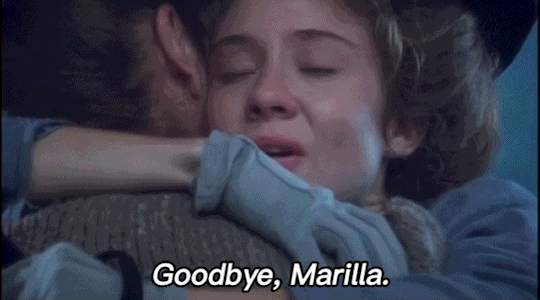
#anne of green gables#aogg#marilla cuthbert#anne’s house of dreams#anne of ingleside#rainbow valley#rilla of ingleside#anne shirley#anne shirley blythe#anne blythe#rilla blythe#aoggsource#l m montgomery#l. m. montgomery#lucy maud montgomery#favorite characters#fictional characters#comfort characters#comfort books#book characters#character study#literature#literary analysis#literary#analysis#classic literature#canadian literature#classic books#book quotes#bookblr
39 notes
·
View notes
Text
The Blythe kids, ranked
tagging @gogandmagog and @mollywog to also rank the kids in my extremely niche 'rank the blythe kids' challenge (if you want to!)
caveat that this is all my personal preference and I haven't read Rainbow Valley or Anne of Ingleside in years--however, I do remember my opinion of the kids from when I read it.
5. Nan and Di
Sorry to Nan and Di, but they never really became real people to me. I don't place the fault at their feet but rather at the fact that we never really got to explore their adult viewpoint--they're very much background characters in Rilla. It's to the point that I can't pick which one I prefer, because both of them kind of blend together in my head. We know that adult Nan loves Jerry, giving us insight in her tastes, and adult Di is best friends with Walter--and that's about it. They're part of the war effort, but not in a way that would reveal any unique insights into their character.
4. Jem
DON'T KILL ME I know Jem is dashing and Lil Jem is adorable, but he kinds of reads as a more aggressive version of Gilbert. However, just because he's ranked so low here doesn't mean I don't hold a deep love for him. I especially love his relationship with Walter (and the fact that he named his son Walter...pain). I have a story idea that involves a series of vignettes of Jem and Walter growing up together--Jem, who always looked out for his little brother, until one day he couldn't anymore. Someone here had the brilliant point that Jem comes back to Ingleside after the war and everyone has already mourned Walter, but to him, as he states in the book, it's all fresh. What must that be like, having a little brother you always protected die a violent death.
Jem also demonstrates two interesting things throughout AoGG: (1) he had trouble understanding Walter growing up, which makes sense because they were very different, and (2) in the end, he was one of the people who knew Walter best. He recognized, unlike many others until Walter's death, that Walter was the bravest of them all; as he states, only Walter's imagination scared him, not reality.
3. Shirley
Shirley, you say?? The Shirley we barely know anything about it?? Shirley over Jem??
I don't have an explanation for you; I just have this inexplicable soft spot for the quietest of the Blythes. Perhaps also because he is "Mother Susan's" son; I think that was a beautiful plot line for LMM to include. Perhaps it's because I read a fantastic story the other day describing him as the observer, and I was like "so true" as I read it.
Shirley is interesting because he's different. None of the other Blythes come across as quiet or shy, because they are, after all, Anne Shirley's children. To me, that raises the question of what it must have been like growing up in a family so different from you. Because of that, I don't suffer the same issue I do with Nan and Di, of lacking unique insights despite the almost complete lack of Shirley's viewpoint throughout the books. Shirley is set up almost (unintentionally) as a foil to the others, which makes up for his otherwise near absence in most of the books. We know that he's uncomfortable with displays of emotion and that he prefers to walk in companiable silence rather than chattering. That, combined with the contrast to the other figures in his life, makes for a compelling character to me, even if this compelling character never got fleshed out.
2. Rilla
I've written before about how Rilla is one of the more interesting of Anne's children because she's very different from the typical LMM heroine. She's flighty, shallow, and self-involved. This makes her journey all the more touching, however, as she grows into a mature woman, shaped by WWI irrevocably. Including Rilla on the list does somewhat feel like a cheat, because she benefits from the focus of an entire book. Which means it's all the more surprising (although not if you follow me) that in first place, we have...
Walter
Your honor--I love him. Please, someone make a movie about him. Please, someone write more fanfic about him. Walter Blythe is a gentle man who is also full of rage; a sensitive man who hates the thought of pain but when the time comes can look it straight in the eye without flinching. He's bullied growing up, and bullied again as a grown-up. He's implied to have a depth that the other characters do not have; I don't mean in how he has premonitions, nor do I mean a literary depth, but rather, LMM marks him as one of a kind special person (almost in a 'chosen one' sense). The others grimly or excitedly prepare for the war; Walter immediately knows that the world will never be the same again. The others are confident, even arrogant, if timid; Walter is crippled by self doubt. Many of the others, although not all, possess a firm practicality and down to earth humor; Walter is dreamy with his head in the clouds. The others get into spats or childish fistfights as onlooks cheer; Walter beats Dan Reese so savagely he makes the onlookers cry. The others form meaningful romantic relationships; Walter never does because, tragically, he runs out of time. Gentle, savage, fearful, brave; Walter Blythe is all of these things and more. He is also doomed. LMM marks him as doomed from the beginning, lending a dark undertone to his story that no other LMM character has. Walter's life--his fate--is shaped by violence: fear of it, flight from it, defeat of it, death from it. This shaping results in him being the most unique Blythe child, and in my opinion, most unique LMM character.
(On a lighter note, hollywood execs if you're reading this, I will pay you 4 billion fake dollars if you make a movie about walter blythe...I never felt the need to write LMM fanfic except about him, i'm that desperate for more content)
#ps I didn't include Joyce because :(#blythe children#walter blythe#aogg#rilla of ingleside#lm montgomery
61 notes
·
View notes